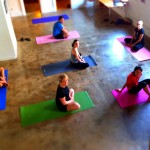Are you stressed over current economics? Do you find yourself less healthy or more irritable lately? Even if you’ve been affected by all the latest news, you can invite tranquility into your life, and learn how to focus on your priorities.
To that end we offer 77 easy and painless tips to help you focus. And, each tip also will help invite tranquility and relaxation into your life. The tips below are categorized by topic and times of day to help you pick and choose the tips that work for you. We don’t value one tip over another, as not all techniques work for all people. But, if you’re searching for peace of mind, you might try them all.
Throughout the Day
No matter if you work in an office or at home, the following tips can help you make it through a stressful day.

- Be Positively Selfish: Take time for yourself. If you aren’t good to yourself, you’re not going to be good for anyone else. Take a walk in the woods, soak in a tub; but, do it alone. Even if you don’t have kids, you can learn from this article about how to “gift” yourself during stressful times.
- Environment Matters: You don’t eat in the bathroom, and you don’t sleep in the garbage bin. But, if you take a look around, you may find that you’re simulating those negative environments in your office or bedroom. Spend time cleaning the clutter, as a pleasant environment contributes to a pleasant state of mind.
- Productivity is Key: Although you may feel as though you can’t lift your pinky finger, thanks to apathy or depression, systematic productivity can help you feel good about yourself. Do one thing at a time and enjoy it; or, at least enjoy getting it done. Learn more from this free book about how to prevent stress through positive productivity.
- Self-Massage: Learn how to relieve headaches, tired eyes, sore muscles and more through these short videos. Each video tackles a specific problem, and they’re all rated highly. This means you don’t need to stress out about paying a massage therapist; although a professional massage on occasion will help you feel righteous about yourself.
- Learn How to Breath: Breath focus is a common feature of several techniques that evoke the relaxation response, a technique first developed in the 1970s at Harvard Medical School by cardiologist Dr. Herbert Benson. Learning how to breath is one method involved in that technique, and a major factor in avoiding stress and fear.
- Don’t Worry: Whether you’re spiritual or religious or none of the above, your ability to believe that everything will turn out ok is key to peace of mind. The saying, “Things happen for a reason,” may help you see the bright side in dark situations. Or, you can learn how to stop worrying unnecessarily through some techniques developed by Dale Carnegie in 1948.
- Consider the Source: Relying on other people’s opinions is good for certain decisions. But, consider the source: if that person is placing a burden on you with guilt, wrong information or other negative motives, then you can detach from that source for some inner peace. Use the tips at this link to learn more about how to discern “good” information from “bad” sources.
- Break the Monotony: Women and children are constantly warned to change their patterns if they walk every day to the same location. The reason behind this advice is safety, but it also helps bring vitality to life and a sense of control and peace. Change up your lifestyle (especially if you’re single) to see if you achieve the same feelings…turn off the TV and exercise, invite friends over for a game of cards or even think about a new career.
- Get More Exercise: Stress may affect your heart, but stress from exercise strengthens your heart. You may hate to exercise, but you can find ways to move without calling it “exercise.” Walk around the mall and window-shop, or take the stairs instead of the elevator. Do some housework or create a garden. Exercise can elevate your mood, help concentration and focus and help you sleep better at night.
- Control the Noise: If you live near an airport, try to move. If your roommate watches car races all day long, buy some headphones for your roommate (and try to remember that car racing is seasonal). The point is to learn how to control the noise in your environment for your peace of mind. Noise pollution can take a toll on your health and happiness. See “Music Tips” below for more information.
Music Tips
Music can prove relaxing or stressful, depending upon your situation. The following tips may help you decide when, where and what you want to hear to help you focus and remain calm.

- Learn About Music: Music can manage pain, improve mood and mobility, reduce the need for pain relievers and sedatives, relieve anxiety, lower blood pressure, ease depression and enhance concentration and creativity. Yes, really. Give it a shot.
- Get a Beat Going: Research has shown that music with a strong beat can help provide sharper concentration and more alert thinking. Plus, rhythmic music may change brain function and treat a range of neurological conditions, including attention-deficit disorder and depression. Use music with a beat when you’re feeling down and need to focus.
- Slow it Down: If you want to relax, the last thing you need is “dance fever” music. Instead, choose something soothing. If soothing music can help overcome anxiety, stress and maybe even depression in pregnant women, it may work for you, too.
- Control Your Environment: Why listen to news when you’re preparing a meal? You want love in that food, not stress. Whether upbeat or soothing, music can alter your environment, and never forget that you can control of the music choice and volume.
- Music Therapy: Music can be used to address physical, emotional, cognitive and social needs for individuals of any age. If you want to learn more about how music affects you and your environment, visit the American Music Therapy Web site.
Eating Tips
You are what you eat…so if you eat junk food on the run, expect a lousy day. Sugar, salt and fatty foods are a great way to avoid the ability to focus and the peace of tranquility. The following tips will help you manage your intake for optimum health and well-being.

- Eating Causes Stress: Even if you’re digging into your favorite food groups, eating causes what is known as “oxidative stress.” But, antioxidants can fight that situation, and healthy compounds found in fruits and vegetables will do the trick.
- Manage Stress with Food: While eating food is stressful, certain foods are more harmful than others. Some foods can help you manage stress, some can help elevate your mood and others can calm and relax you. Try food, instead of drugs, to help manage your day. But, try to avoid overeating, as this activity can lead to obesity, which can lead to poor sleep and even more stress and depression.
- Eat Your Good Cholesterol: And, help to eliminate the “bad” LDL cholesterol with certain foods such as oatmeal, olive oil, certain nuts and more.
- Eat Fresh: You can avoid budget stress, achieve a calm mind and sleep better if you eat meals that are fresh, rather than salty and fatty foods and “junk food.” Overeating — and eating the wrong foods — are major factors that work against focus and tranquility. Use a meal planner like this one to help lower your stress about cooking, too.
- Eat Regular and Right: No matter if you eat 100 calories per hour, three full meals with fruit snacks in between, or just three meals…a regular diet will help you sleep better and also will help you maintain energy and brain power throughout the day.
At Work
There is mounting evidence that work can age you, thanks to the stress involved in deadlines, negative environments and little room for mistakes. But, if you can apply some of the following tips, perhaps you’ll begin to feel younger and more tranquil:

- Work in Fresh Air: If you can, try to work or study in fresh air. Open a window if possible or make sure ventilation is working well. Fresh air helps to keep your mind clear and focused and revitalizes your body.
- Introduce Plants to the Indoors: If you can’t introduce fresh air, Plants help to absorb pollutants and they raise the level of fresh oxygen in the air, too. Plus, plants add visual appeal, and taking care of them often adds to one of life’s joys.
- Take Sun Breaks: Take breaks to stand outside on sunny days. Seasonal Affective Disorder (SAD) is known to occur in individuals who don’t get sufficient amounts of sunlight. Melatonin, which is a sleep-related hormone, is secreted in increased levels in the dark. Good for sleep, but not for work.
- Eliminate Tobacco Smoke: If you still smoke, do it outside. Don’t bring pollutants into your work or home environment, even if you continue to ingest them internally. This habit also helps to eliminate second-hand smoke, a problem that can cause cancer and other health problems for others.
- Find Birds of a Feather: Those birds tend to flock together…if you want to get work done, hang around with the workers. If you want to relax, avoid the gossips, nay-sayers and whiners. If you work solo, try to stay in touch with positive people through social networks such as FaceBook, Twitter, etc. You can turn social networks off and on during the day, just like the phone.
- Create a Focus: Even if you’re not interested in what you’re doing, try to fake it. Dr. Anne Reith, author of several gooks on student success, suggest pretending that you are a reporter who must write an article on a lecture. This type of concentration works during that board meeting as well.
- Exercise Before or During Work: University of Bristol researchers found that employees who enjoyed a workout before going to work — or exercised during lunchbreaks — were better equipped to handle whatever the day threw at them. Try these “workexercise” tricks to get started and build from there.
- Be in the Moment: In other words, avoid multi-tasking. While conducting two or more tasks at one time might seem productive, in reality you avoid focusing on a single task to completion. Multi-tasking the antithesis to tranquility.
- Let Go: Of control, that is. You are not the Master of the Universe, even if you’re the boss. Learn to separate yourself from your tasks and learn how to delegate. Others will be happy for the responsibility and you will be less stressed and more focused on your priorities.
After Work
- Develop Supportive Friendships: You may not want to develop these friendships among co-workers, vendors or other people who affect your work. Instead, look to family, friends outside of work and others who maintain similar interests and a desire to relax in a healthy way.
- Help Others: One way to forget your own problems is to help others. One person even discovered that it helped his business when he helped his competitors. If you can’t go that far, at least help your neighbor, volunteer at a soup kitchen, or travel while helping to build homes. This is a great way to focus on gratitude.
- Avoid the Bar: If you have a habit of visiting the local bar after work, try something different. Take a walk, head home and have a glass of wine with dinner instead. You may sleep better, and you can avoid all the bar drama and Karaoke as well.
- Take a Class: Expand your horizons and develop more self-confidence through adult-learning classes. Instead of using these classes to advance your career, branch out into something different. Learn (or re-learn) how to cook healthy meals, take a yoga class or learn how to dance. You’ll focus on your new learning, which is a great way to put the workday behind you.
- Make New Resolutions: You don’t need to wait for the New Year to make new resolutions. Create goals, and take baby steps each day after work to reach them. With each small step toward your goal, you may feel a sense of renewed focus and accomplishment.
In the Evening
Sometimes the best way to avoid stress in the future is to take care of things now. This includes the following items:

- Plan Your Wardrobe: Plan ahead for what you’ll wear to work the next day or even for the entire week. If you need to do laundry or iron a piece of clothing or clean your shoes, this is the time to do it. Although you aren’t a kid in school anymore, laying you’ll be happy you took care of yourself when morning comes around (this article also shows you how to clean out that closet).
- Prepare for Work: If you need to prepare for a meeting the next day or for other activities, make sure you have everything you need now. That way, you can wake up peacefully, knowing that you are in control of your destiny. If, as in this article, you must prepare for work in a home office, take heed and learn how to separate your office from your personal life.
- Identify Stressors: Begin to identify the things that stress you out during the workday. Make a list, and begin to weed out those stressors. For those triggers you can’t eliminate, begin to find ways to make them less stressful.
- Simplify Your Plans: While you’re taking care of the things you need for the next day, you can begin to see some items on your list(s) that you can eliminate. Take care of priorities, then see what you can eliminate…maybe you’ll have some time for that relaxing walk in the sun during lunch, rather than yet another meeting.
- Identify the Source: As you begin to simplify your plans for the following day, touch base with how you feel about these eliminations. Maybe the stress is coming from inside you, and not from outside? If you can identify the source of your stress, this revelation could help you to obtain some peace.
- Plan for the Unexpected: What if you lose your job tomorrow? Don’t be stressed; be prepared! Develop a “Plan B” during this time each day that will help you face the unexpected. Update your resume, learn new skills, and create goals that are achievable over a period of time. If you’re prepared for the unexpected, you’ll feel more confident and at peace.
Before Bed
There are many things you can do to invite tranquility into your life so you can sleep well. Here are a few of those ideas:

- Pamper Yourself: Some folks think that manicures and pedicures are a waste of money, but one session with a professional can make a person feel like new. You can do this at home, too. Take care of your body and you’ll feel good about yourself. Plus, you can rest easier when you know you look your best (this includes men).
- Home Spa Experience: If you have a hot tub, you already know how even a short soak can bring relaxation into your life. But, you can set up a spa in your bathroom, too. This link will take you to an article that will help with your home spa experience.
- Practice Meditation: Meditation is not easy, especially if your head is spinning with things you MUST do. But, begin slowly and you may discover that meditation is a great practice, and it could help bring tranquility into your life.
- Learn Visualization: Based upon guided imagery, you can learn how to imagine your future, one filled with a focus on success and tranquility. Can you have both? If you can visualize it, perhaps you can! At the very least, visualization is a great way to focus and to relax.
- Light Exercise: If you’re feeling “antsy” before bed, try yoga to calm your body and soul. While some people can engage in vigorous exercise before bedtime, rigorous exercise is detrimental to sleep for others. You’ll need to discover what works for you.
- Practice Progressive Muscle Relaxation: When you tense and relax all the muscle groups in your body, you can relieve tension and achieve relaxation in minutes. You can try this in bed, too, to speed sleep your way.
- Make Love, Not War: If you have a partner, you may know that sex provides a great way to relieve stress and tension. While you may not feel like making love when stressed, this actually is the best time to take a break and spend time with your partner. It sure beats arguing before bedtime!
- Limit Fluid Intake: While fluids, such as water, are necessary for top-notch body functions, try to reduce the amount of fluids you drink before you sleep. This reduction can help you sleep through the night, rather waking in the middle of the night to use the bathroom.
- Try Trytophan Instead of Pills: Tryptophan, an amino acid found in foods such as turkey, chicken, fish, pheasant, partridge, cottage cheese, bananas, eggs, nuts, wheat germ, avocados, milk, cheese and the legumes, can make you sleepy. Tryptophan helps the body produce the B-vitamin niacin, which, in turn, helps the body produce serotonin, a remarkable chemical that acts as a calming agent in the brain and plays a key role in sleep.
- Fall Asleep to Music: You may not like any songs on this person’s list, but it’s a starting point. No matter whether you like soft rock, classical or country music, you can create a playlist that will help you focus more on the music and less on the tornado in your head. Falling asleep to music may help you wake up in a different mood.
During the Night
If you’re not getting a good night’s sleep, then you aren’t achieving a path to tranquility or the ability to concentrate during the day. There are few tips listed here, because if you practice many of the other tips in the other categories, you may find yourself sleeping better anyway!

- High Quality Sleep: How long do you sleep? Sleep deprivation can cause fatigue, reduce brain function and reaction times, and alters mood, among other negative side effects. Plus, lack of sleep can inhibit your desire to exercise or to do other things that will reduce stress and help you to relax. Try to get between seven and eight hours of sleep per night.
- Use Earplugs if Necessary: Does your partner snore? Is the neighbor having a late-night party? While many earplugs may prove uncomfortable, try moldable earplugs that you can shape and fit to your ear. You will achieve a great night’s sleep, but make sure that alarm clock is set to “high” so you wake up!
- Help for sleep: Consistently poor sleep now is associated with overeating and obesity. But, exercise and a balanced diet will help you tackle several problems at once. Plus, attention to your environment and what you eat and drink are huge factors that you can control.
- Sleep Disorders: Sleep disorders often are caused by a number of factors, including heavy meals, alcohol, caffeine and nicotine. Other problems for a healthy sleep include stress, depression, late vigorous exercise and emotional or mental problems. Try to eliminate as many causes for irregular sleep as possible.
- Get Help: If you have eliminated all possible problems for sleep disorders and you still can’t sleep, then seek help. Continued sleep disorders can lead to physical disorders and emotional problems. An article like the one linked here can give you information you might need to tackle various sleep problems, one problem at a time.
In the Morning
If you’re stressed or depressed, the best time to get yourself in the mood for the day is in the morning. While you may not want to get out of bed, perhaps some of the following tips can help revitalize you and relieve some of your stress.

- Wake up to Music: While some people might want to hear soothing music in the morning, try something with a beat, instead. The beat could help move your heart and breathing to go in sync with the music’s beat. But, if the music makes you jittery, slow it down.
- Deep Breathing: Deep breathing is one of the best ways to lower stress in the body. At the same time, deep breathing can help you focus and feel re-energized. Before you leave the bed, do some deep breathing exercises to get your blood moving in a positive way.
- Morning Massage: You don’t need to leave your bed to practice some stimulating massage. Big stretches, head massages and “scalp tapping” can stimulate your body and soul. Try the routine suggested in this article at the UK Guardian.
- Stretch: As you age, you begin to lose some muscle tone and range of movement. Simple stretching can help you retain your range of motion. But, be careful: stretching also can cause injuries, so start slowly. A side benefit is that stretching gets your blood moving, helping you to focus.
- Eat Breakfast: Yes, this is the most important meal of your day. You are “breaking a fast” that you endured during sleeping, and what you ingest now can make or break your morning. If studies show that children who eat breakfast perform better in school, it doesn’t take much thought to realize that adults could feel and perform better at work.
- Take a Walk or Exercise: Like stretching, walking can contribute to brain “fitness”, but it also helps to strengthen your heart and can delay or prevent major diseases or illnesses. Exercise, also, can help you feel on top of the world, especially if you exercise in the morning. You get a kick-start, a new focus on your day, and this practice also helps you to sleep at night.
- Start with Green Tea, Not Coffee: A cup of green tea can fill you with antioxidants and is a healthy lifestyle choice to start your day. If you feel the need for caffeine, you can find it in some green teas to help wean yourself away from the brew.
Drive Time
Ever feel that road rage coming on while driving to and from work? Here are a few solutions that can help you focus and retain a tranquil morning.

- Manage Your Time: Plan to arrive early, so if traffic is slow you won’t be late. Often, road rage occurs when we’re angry about the inability to control a situation. If you plan for enough time to travel, you can retain your equilibrium.
- Breathe Through the Tension: Did you learn how to breathe correctly to relieve tension? Use your knowledge now to make it to the next stoplight.
- Listen to Audio Books or Music: Use this down time to listen to music or to catch up on your audio “reading.” Soothing music, upbeat dance tunes or funny audio books can help break any tension you might feel. And, you might just sing along to release some anger. Just be sure to concentrate on traffic when you’re moving again.
- Take Public Transportation: If you take the bus or train, you might find time to catch up on your reading. Leave the driving to someone else and arrive unhassled and fresh to and from work.
- Ride Share: While ride-sharing helps cut gas costs, it also can keep you in line. You might curse at another driver when alone, but you might hold your tongue with someone in the car. You can relieve that tension later on the treadmill. Use local tools like the one linked here for Cal Poly students to find a person to ride with you.
- Try Automotive Aromatherapy: New studies have shown that the smell of cinnamon or peppermint might take the edge off road rage during your next traffic jam. Peppermint and cinnamon odors boost motivation, performance, and alertness while cutting fatigue and stimulating the brain.
- Be Productive: If down time is what gets under your skin, turn that traffic jam into a production session. Make sure a tape recorder is with you at all times, so you can take notes or dictate letters.
Maintain Healthy Choices
Even if you can’t afford health insurance, think about spending a few dollars here and there on health maintenance. Silent killers, such as cholesterol and high blood pressure are especially important to monitor. If you are in good health and you know it, it’s easier to focus and maintain a relaxing lifestyle.

- Learn About Blood Pressure: A stressful life can lead to higher blood pressure, and high blood pressure is a major risk factor for heart attacks, strokes and heart failure. Your systolic blood pressure should be below 140 and your diastolic blood pressure below 90. Certain individuals need to achieve even tighter control of their blood pressure.
- Get a Blood Pressure Monitor: You can check your own blood pressure daily or even twice a day. Additionally, owning a cuff means that you can check your blood pressure after exercising. This tool is a huge help for you and your doctor as you can help that doctor stay on top of any changes in your health plan.
- Check Cholesterol Levels: The only way to know if you have a healthy cholesterol level is to get it checked. If you have not had your levels checked in the past year or two, get them checked now. The ideal level for your LDL (“bad” cholesterol) is less than 100. Keeping your HDL (“good” cholesterol) levels up is also important. Know your lipid levels and talk to your physician about the best plan of action to keep your cholesterol levels ideal.
- Keep a Journal: When you document your progress in a journal, you can begin to see your progress in all your goals. This is a tool that help you reach for more changes that will help you avoid stress and meet tranquility head on.
Understand Stress Myths
Finally, it’s good to understand that some stress is good. Stress can force positive and healthy changes, and — since relaxation and focus is the opposite of stress — you can use stress as a measurement to determine your progress toward a better life. The following myths may help you understand whether a renewed focus and tranquility are possibilities for you…since stress is, after all, unavoidable.

- Stress is the Same for Everyone: No, it’s not. Some younger folks or healthier people or those who have a higher tolerance for risk may handle stress better than others. Some people thrive on stress, while others need more serenity in their lives. Only you can determine where you stand on stress boundaries.
- You Can Avoid Stress: Stress is everywhere so you cannot avoid some stress, but you can do something about the level of stress you experience. Each day brings new surprises, and not all those surprises are great for your peace of mind. However, if you’re prepared to meet these challenges head on with a healthy body, a great support group and preparation, you may experience a new focus and serenity.
- You Know When You’re Stressed: Not necessarily. Some people have been under so much stress for so long that it feels like a way of life. Minor stress symptoms, such as headaches and heartburn, cannot be ignored, however. Before long, you may experience major symptoms such as heart failure or stroke. At that point, it may be too late to turn your life around. Don’t let your stress, even minor, gain the upper hand over your health, focus and tranquility.
- All Relaxation Techniques Work: Every person responds to different techniques in different ways, just as every person reacts to stress differently. Some people may need to use a punching bag before he or she can relax. Others may just need five minutes of a beautiful sunset to turn a day around. You won’t know what works for you until you try it, however. So, get started with this list to find what works for you.

